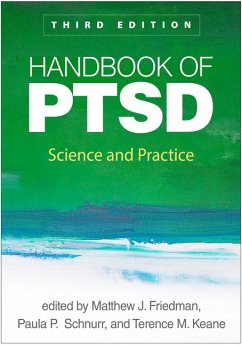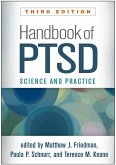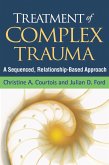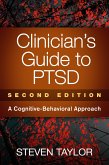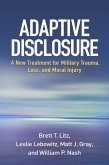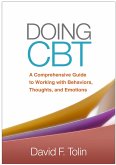Handbook of PTSD
Science and Practice
Herausgeber: Friedman, Matthew J; Keane, Terence M; Schnurr, Paula P
Handbook of PTSD
Science and Practice
Herausgeber: Friedman, Matthew J; Keane, Terence M; Schnurr, Paula P
- Broschiertes Buch
- Merkliste
- Auf die Merkliste
- Bewerten Bewerten
- Teilen
- Produkt teilen
- Produkterinnerung
- Produkterinnerung
Now in an extensively revised third edition with 65% new material, this is the authoritative reference on posttraumatic stress disorder (PTSD). Contributors examine the breadth of current knowledge on the mechanisms by which stressful events can alter psychological processes, brain function, and individual behavior. Risk and protective factors across development and in specific populations are explored. Reviewing the state of the science of assessment and treatment, the volume covers early intervention and evidence-based individual, couple/family, and group therapies. Conceptual and diagnostic…mehr
![Handbook of Ptsd Handbook of Ptsd]() Handbook of Ptsd120,99 €
Handbook of Ptsd120,99 €![Treatment of Complex Trauma Treatment of Complex Trauma]() Christine A. CourtoisTreatment of Complex Trauma42,99 €
Christine A. CourtoisTreatment of Complex Trauma42,99 €![Clinician's Guide to Ptsd Clinician's Guide to Ptsd]() Steven TaylorClinician's Guide to Ptsd48,99 €
Steven TaylorClinician's Guide to Ptsd48,99 €![Adaptive Disclosure Adaptive Disclosure]() Brett T. LitzAdaptive Disclosure87,99 €
Brett T. LitzAdaptive Disclosure87,99 €![Psychiatry, Politics and PTSD Psychiatry, Politics and PTSD]() Janice HaakenPsychiatry, Politics and PTSD64,99 €
Janice HaakenPsychiatry, Politics and PTSD64,99 €![Doing CBT Doing CBT]() David F. TolinDoing CBT80,99 €
David F. TolinDoing CBT80,99 €![Mindfulness and Meditation in Trauma Treatment Mindfulness and Meditation in Trauma Treatment]() Lynn C. WaeldeMindfulness and Meditation in Trauma Treatment42,99 €
Lynn C. WaeldeMindfulness and Meditation in Trauma Treatment42,99 €-
-
-
- Produktdetails
- Verlag: Guilford Publications
- 3 ed
- Seitenzahl: 670
- Erscheinungstermin: 1. November 2023
- Englisch
- Abmessung: 257mm x 180mm x 33mm
- Gewicht: 1152g
- ISBN-13: 9781462553785
- ISBN-10: 1462553788
- Artikelnr.: 68358772
- Verlag: Guilford Publications
- 3 ed
- Seitenzahl: 670
- Erscheinungstermin: 1. November 2023
- Englisch
- Abmessung: 257mm x 180mm x 33mm
- Gewicht: 1152g
- ISBN-13: 9781462553785
- ISBN-10: 1462553788
- Artikelnr.: 68358772
Matthew J. Friedman
Paula P. Schnurr
& Terence M. Keane 2. DSM-5 Criteria for PTSD
Matthew J. Friedman
Michelle J. Bovin
& Frank W. Weathers 3. Historical Roots of the PTSD Construct: How PTSD Became a Diagnosis and Launched the Traumatic Stress Field
Alexander C. McFarlane & Dean G. Kilpatrick II. Scientific Foundations and Theoretical Perspectives 4. Epidemiology of Trauma and PTSD in Adults
Kristina J. Korte
Tammy Jiang
Karestan C. Koenen
Sandro Galea
& Jaimie L. Gradus 5. Epidemiology of Trauma and PTSD in Childhood and Adolescence
William E. Copeland & Ellen W. McGinnis 6. Psychological Models of PTSD
Richard A. Bryant 7. Alterations in Memory and Other Neurocognitive Processes
Chris R. Brewin & Jennifer J. Vasterling 8. Trauma-Induced Dissociation
Anne P. DePrince
Martin J. Dorahy
Ruth Lanius
& Francesca L. Schiavone 9. Examining Neurocircuitry and Neuroplasticity in PTSD
Lynnette A. Averill
Christopher L. Averill
Teddy J. Akiki
& Chadi G. Abdallah 10. Neurochemistry
Neuroendocrinology
and Neuroimmunology of PTSD
Ann M. Rasmusson
Byung K. Kim
Tiffany R. Lago
Kayla Brown
Caitlin Ridgewell
& Arieh Y. Shalev 11. Genetics of PTSD
Daniel Bustamante
Kaitlin Bountress
Christina Sheerin
Karestan C. Koenen
Guia Guffanti
Lulu Yan
Michelle Haloossim
Monica Uddin
Nicole Nugent
& Ananda B. Amstadter 12. What Brain Tissue Can Tell Us: Postmortem Brain Banking and Analysis of PTSD Molecular Pathology
Matthew J. Girgenti
Bertrand R. Huber
Matthew J. Friedman
& Ronald S. Duman 13. Gender Issues in PTSD
Rachel Kimerling
Julie C. Weitlauf
& Amy E. Street 14. A Developmental Perspective on Childhood Traumatic Stress
Adam D. Brown
Emily Becker-Weidman
& Glenn N. Saxe 15. Trauma and PTSD in Older Adults
Joan Cook & Vanessa Simiola III. Clinical Practice: Evidence-Based State of the Art 16. Assessment of PTSD and Its Comorbidities in Adults
Nicholas A. Livingston
Deborah J. Brief
Mark W. Miller
& Terence M. Keane 17. Assessment of PTSD in Children and Adolescents
Ernestine C. Briggs
Kate Nooner
& Lisa M. AmayäJackson 18. Early Intervention Following Trauma
Alvi Azad
Leonard Skipper
Gary H. Wynn
& David M. Benedek 19. Psychosocial Treatments for Adults with PTSD
Tara E. Galovski
Carmen P. McLean
C. Adrian Davis
& Jennifer S. Wachen 20. Psychosocial Treatments for Children and Adolescents with PTSD
Judith A. Cohen & Anthony P. Mannarino 21. Empirically Supported Couple and Family Therapies for PTSD
Candice M. Monson
Alexandra Macdonald
Steffany J. Fredman
Jeremiah A. Schumm
& Casey Taft 22. Group Treatments for PTSD
J. Gayle Beck & Denise Sloan 23. Pharmacotherapy for PTSD
Lori Davis
Patricia Pilkinton
& Garrett Aikens 24. Treating PTSD When Common Comorbid Disorders Are Present
Sonya B. Norman
Elizabeth Straus
Robert C. Lyons
Laura D. Crocker
Peter J. Colvonen
& Jessica C. Tripp 25. Trauma Exposure
PTSD
and Physical Health
Paula P. Schnurr
Jennifer S. Wachen
Bonnie L. Green
& Stacey Kaltman IV. Emerging Territory 26. Culture
Trauma
and Traumatic Stress among Refugees
Asylum Seekers
and Postconflict Populations
Derrick Silove & Louis Klein 27. PTSD and the Law: Forensic Considerations
Dean G. Kilpatrick
Alexander C. McFarlane
& Lucy A. Guarnera 28. Technology-Based Interventions for PTSD
Josef I. Ruzek 29. Treating PTSD Using Telemental Health Technology
Leslie A. Morland
Lisa H. Glassman
Carolyn J. Greene
Julia E. Hoffman
& Craig Rosen 30. Psychoneurobiology of Resilience
Lynnette A. Averill
Christopher L. Averill
Robert H. Pietrzak
Dennis S. Charney
& Steven M. Southwick 31. Public Mental Health Interventions Following Disasters
Joshua C. Morganstein
Holly B. Herberman Mash
Mary C. Vance
Carol S. Fullerton
& Robert J. Ursano 32. Dissemination and Implementation of Best Practices in Prevention and Treatment of PTSD
Shannon Wiltsey Stirman 33. Key Questions and an Agenda for Future Research
Matthew J. Friedman
Paula P. Schnurr
& Terence M. Keane
Matthew J. Friedman
Paula P. Schnurr
& Terence M. Keane 2. DSM-5 Criteria for PTSD
Matthew J. Friedman
Michelle J. Bovin
& Frank W. Weathers 3. Historical Roots of the PTSD Construct: How PTSD Became a Diagnosis and Launched the Traumatic Stress Field
Alexander C. McFarlane & Dean G. Kilpatrick II. Scientific Foundations and Theoretical Perspectives 4. Epidemiology of Trauma and PTSD in Adults
Kristina J. Korte
Tammy Jiang
Karestan C. Koenen
Sandro Galea
& Jaimie L. Gradus 5. Epidemiology of Trauma and PTSD in Childhood and Adolescence
William E. Copeland & Ellen W. McGinnis 6. Psychological Models of PTSD
Richard A. Bryant 7. Alterations in Memory and Other Neurocognitive Processes
Chris R. Brewin & Jennifer J. Vasterling 8. Trauma-Induced Dissociation
Anne P. DePrince
Martin J. Dorahy
Ruth Lanius
& Francesca L. Schiavone 9. Examining Neurocircuitry and Neuroplasticity in PTSD
Lynnette A. Averill
Christopher L. Averill
Teddy J. Akiki
& Chadi G. Abdallah 10. Neurochemistry
Neuroendocrinology
and Neuroimmunology of PTSD
Ann M. Rasmusson
Byung K. Kim
Tiffany R. Lago
Kayla Brown
Caitlin Ridgewell
& Arieh Y. Shalev 11. Genetics of PTSD
Daniel Bustamante
Kaitlin Bountress
Christina Sheerin
Karestan C. Koenen
Guia Guffanti
Lulu Yan
Michelle Haloossim
Monica Uddin
Nicole Nugent
& Ananda B. Amstadter 12. What Brain Tissue Can Tell Us: Postmortem Brain Banking and Analysis of PTSD Molecular Pathology
Matthew J. Girgenti
Bertrand R. Huber
Matthew J. Friedman
& Ronald S. Duman 13. Gender Issues in PTSD
Rachel Kimerling
Julie C. Weitlauf
& Amy E. Street 14. A Developmental Perspective on Childhood Traumatic Stress
Adam D. Brown
Emily Becker-Weidman
& Glenn N. Saxe 15. Trauma and PTSD in Older Adults
Joan Cook & Vanessa Simiola III. Clinical Practice: Evidence-Based State of the Art 16. Assessment of PTSD and Its Comorbidities in Adults
Nicholas A. Livingston
Deborah J. Brief
Mark W. Miller
& Terence M. Keane 17. Assessment of PTSD in Children and Adolescents
Ernestine C. Briggs
Kate Nooner
& Lisa M. AmayäJackson 18. Early Intervention Following Trauma
Alvi Azad
Leonard Skipper
Gary H. Wynn
& David M. Benedek 19. Psychosocial Treatments for Adults with PTSD
Tara E. Galovski
Carmen P. McLean
C. Adrian Davis
& Jennifer S. Wachen 20. Psychosocial Treatments for Children and Adolescents with PTSD
Judith A. Cohen & Anthony P. Mannarino 21. Empirically Supported Couple and Family Therapies for PTSD
Candice M. Monson
Alexandra Macdonald
Steffany J. Fredman
Jeremiah A. Schumm
& Casey Taft 22. Group Treatments for PTSD
J. Gayle Beck & Denise Sloan 23. Pharmacotherapy for PTSD
Lori Davis
Patricia Pilkinton
& Garrett Aikens 24. Treating PTSD When Common Comorbid Disorders Are Present
Sonya B. Norman
Elizabeth Straus
Robert C. Lyons
Laura D. Crocker
Peter J. Colvonen
& Jessica C. Tripp 25. Trauma Exposure
PTSD
and Physical Health
Paula P. Schnurr
Jennifer S. Wachen
Bonnie L. Green
& Stacey Kaltman IV. Emerging Territory 26. Culture
Trauma
and Traumatic Stress among Refugees
Asylum Seekers
and Postconflict Populations
Derrick Silove & Louis Klein 27. PTSD and the Law: Forensic Considerations
Dean G. Kilpatrick
Alexander C. McFarlane
& Lucy A. Guarnera 28. Technology-Based Interventions for PTSD
Josef I. Ruzek 29. Treating PTSD Using Telemental Health Technology
Leslie A. Morland
Lisa H. Glassman
Carolyn J. Greene
Julia E. Hoffman
& Craig Rosen 30. Psychoneurobiology of Resilience
Lynnette A. Averill
Christopher L. Averill
Robert H. Pietrzak
Dennis S. Charney
& Steven M. Southwick 31. Public Mental Health Interventions Following Disasters
Joshua C. Morganstein
Holly B. Herberman Mash
Mary C. Vance
Carol S. Fullerton
& Robert J. Ursano 32. Dissemination and Implementation of Best Practices in Prevention and Treatment of PTSD
Shannon Wiltsey Stirman 33. Key Questions and an Agenda for Future Research
Matthew J. Friedman
Paula P. Schnurr
& Terence M. Keane

